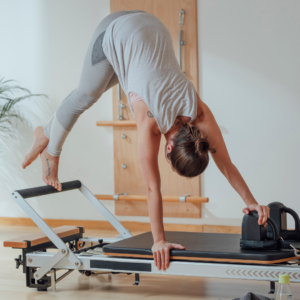Table of Contents
Introduction
Pilates Stress Reduction
Pilates for Anxiety and Mental Health
Pilates' Stress-Relieving Science
Q&A
Conclusion
"Pilates: Stress-free mind and body."
Introduction
Pilates strengthens core muscles, improves flexibility, and promotes physical and mental health. Pilates is a popular stress reliever. Does Pilates alleviate stress? Examine the evidence.
Pilates Stress Reduction
Pilates is growing in popularity. This low-impact workout strengthens core muscles, improves flexibility, and raises body awareness. Pilates relieves stress and improves physical fitness.
Millions suffer from stress. Work, relationships, income, and health can trigger it. Chronic stress can cause anxiety, depression, and heart disease.
Pilates helps reduce stress by relaxing. Pilates' slow, controlled motions require concentration, which calms the mind and reduces anxiety. Pilates' deep breathing methods can also lower blood pressure and pulse rate, promoting calm.
Pilates can reduce stress by enhancing physical fitness. Pilates, like other exercise, improves mental wellness. Pilates strengthens core muscles and improves flexibility, reducing injury risk and boosting physical function. Confidence and well-being can lessen stress and anxiety.
Pilates promotes mindfulness and reduces stress. Mindfulness means being present and focused on the job at hand. Pilates demands concentration and awareness, which helps alleviate tension and anxiety.
Finally, Pilates' community and support reduce stress. Group Pilates sessions foster companionship and support. This is especially helpful for lonely or socially isolated people.
Pilates reduces stress. Pilates reduces stress and anxiety by encouraging relaxation, physical health, mindfulness, and community. Pilates is a low-impact activity that can improve your mental and physical wellness.
Pilates for Anxiety and Mental Health
Pilates is growing in popularity. This low-impact workout strengthens core muscles, improves flexibility, and raises body awareness. Pilates improves mental wellness and physical conditioning. Pilates reduces stress and anxiety for many people.
Pilates reduces stress by promoting mindfulness. Mindfulness involves being present and observing one's thoughts and feelings without judgement. Pilates involves intense concentration, which can improve mindfulness. Focusing on physical motions and sensations can help people better manage their thoughts and moods.
Pilates helps alleviate stress by relaxing. Slow, controlled Pilates activities can help relax muscles. Pilates includes breathing exercises to relax the mind and relieve anxiety. Pilates can help people manage stress by teaching them relaxation skills they can use daily.
Pilates improves mental wellness and reduces stress. Regular exercise has been found to improve mood and lessen depression and anxiety. Pilates specifically improves mental health. Anxiety and sadness symptoms decreased significantly among eight-week Pilates practitioners.
Pilates also builds stress resilience. Resilience is the ability to recover and adapt. Pilates challenges people to push themselves, which builds resilience. Pilates can boost self-confidence and help people handle stress and adversity.
Pilates cannot replace mental health care. Pilates can help manage stress and anxiety, but severe problems require expert care. Before commencing an exercise programme, people should visit their doctor.
Pilates reduces stress and improves mental wellness. Pilates can improve mental health by encouraging awareness, relaxation, and resilience. Pilates should not replace professional mental health care, but it can supplement it. Pilates can improve mental health and well-being.
Pilates' Stress-Relieving Science
Pilates is growing in popularity. This low-impact workout strengthens core muscles, improves flexibility, and raises body awareness. Pilates is popular for its physical benefits, but it may also help manage stress.
Pilates helps manage stress by activating the parasympathetic nervous system. This nervous system portion controls the "rest and digest" response. The parasympathetic nervous system relaxes and recovers from stress.
Breathing activates the parasympathetic nerve system in Pilates. Pilates emphasises deep, controlled breathing. This breathing slows the heart rate and calms the mind, reducing tension and anxiety.
Pilates emphasises breathing, mindfulness, and body awareness. Pilates reduces tension and anxiety by focusing on bodily movements and being present. Because mindfulness reduces stress and boosts well-being.
Pilates' physical benefits also reduce stress. Pilates improves posture, muscle tension, and flexibility. These physical benefits reduce stress-related headaches and muscular aches.
Pilates may help manage stress, but it is not a panacea. Pilates should be utilised alongside a healthy diet, proper sleep, and social support, like any other exercise or stress management method.
Pilates is not for everyone. Before starting Pilates, anyone with back discomfort or osteoporosis should visit a doctor. Find a competent Pilates instructor to safely and effectively take you through the movements.
Finally, Pilates is a low-impact stress-buster. Breathing, mindfulness, and bodily awareness boost the parasympathetic nervous system and alleviate stress. Pilates can help reduce stress when combined with other healthy practices.

Q&A
Can Pilates reduce stress?
Yes, Pilates can reduce stress by relaxing the body and mind.
How can Pilates reduce stress?
Pilates relies on breathing, mindfulness, and gentle movements to calm the mind and body.
Does Pilates reduce stress?
Pilates reduces stress and anxiety by focusing on mind-body connection and relaxation.
Conclusion
Conclusion: Pilates reduces stress. Mindfulness, breathing, and exercise reduce stress and promote calm. Pilates can reduce stress by improving physical and mental health.


